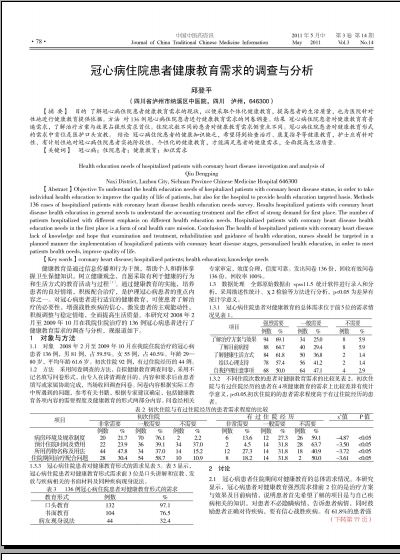冠心病住院患者健康教育需求的调查与分析
 |
| 第1页 |
参见附件(2672KB,2页)。
【摘 要】目的 了解冠心病住院患者健康教育需求的现状,以便采取个体化健康教育,提高患者的生活质量,也为医院针对性地进行健康教育提供依据。方法 对136例冠心病住院患者进行健康教育需求的问卷调查。结果 冠心病住院患者对健康教育有普遍需求,了解治疗方案与效果占强烈需求首位。住院次数不同的患者对健康教育需求侧重点不同。冠心病住院患者对健康教育形式的需求中首位是医护口头宣教。 结论 冠心病住院患者的健康知识缺乏,希望得到检查治疗、康复指导等健康教育,护士应有针对性、有计划性地对冠心病住院患者实施阶段性、个性化的健康教育,才能满足患者的健康需求,全面提高生活质量。
【关键词】冠心病;住院患者;健康教育;知识需求
Health education needs of hospitalized patients with coronary heart disease investigation and analysis of
Qiu Dengping
Naxi District, Luzhou City, Sichuan Province Chinese Medicine Hospital 646300
【Abstract】Objective To understand the health education needs of hospitalized patients with coronary heart disease status, in order to take individual health education to improve the quality of life of patients, but also for the hospital to provide health education targeted basis. Methods 136 cases of hospitalized patients with coronary heart disease health education needs survey. Results hospitalized patients with coronary heart disease health education in general needs to understand the accounting treatment and the effect of strong demand for first place. The number of patients hospitalized with different emphasis on different health education needs. Hospitalized patients with coronary heart disease health education needs in the first place is a form of oral health care mission. Conclusion The health of hospitalized patients with coronary heart disease lack of knowledge and hope that examination and treatment, rehabilitation and guidance of health education, nurses should be targeted in a planned manner the implementation of hospitalized patients with coronary heart disease stages, personalized health education, in order to meet patients health needs, improve quality of life.
【Key words】coronary heart disease; hospitalized patients; health education; knowledge needs
健康教育是通过信息传播和行为干预,帮助个人和群体掌握卫生保健知识,树立健康观念,自愿采取有利于健康的行为和生活方式的教育活动与过程[1]。通过健康教育的实施,培养患者的良好情绪,积极配合治疗,是护理冠心病患者的重点内容之一。对冠心病患者进行适宜的健康教育,可使患者了解治疗的必要性,增强战胜疾病的信心,激发患者的主观能动性,积极调整与稳定情绪,全面提高生活质量。本研究对2008年2月至2009年10月在我院住院治疗的136例冠心病患者进行了健康教育需求的调查与分析,现报道如下。
1对象与方法
1.1对象2008年2月至2009年10月在我院住院治疗的冠心病患者136例,男81例,占59.5%。女55例,占40.5%。年龄29—80岁,平均年龄61.6岁。初次住院92例,有过住院经历的44例。
1.2方法采用问卷调查的方法,自拟健康教育调查问卷,采用不记名填写问卷形式,由专人在讲清调查目的、内容和要求后由患者填写或家属协助完成,当场收回调查问卷。问卷内容根据实际工作中所遇到的问题,参考有关书籍,根据专家建议确定,包括健康教育各项内容的需要程度及健康教育的形式两部分内容。问卷经相关专家审定,效度合理,信度可靠。发出问卷136份,回收有效问卷136份,回收率100%。
1.3数据处理全部原始数据由spss11.5统计软件进行录入和分析,采用描述性统计、ⅹ2检验等方法进行分析,p<0.05为差异有统计学意义。
1.3.1冠心病住院患者对健康教育的总体需求位于前5位的需求情况见表1。
1.3.3冠心病住院患者对健康教育形式的需求见表3。表3显示,冠心病住院患者对健康教育形式需求前3位是口头讲解和宣教、发放与疾病相关的书面材料及同种疾病现身说法。
2讨论
2.1冠心病患者住院期间对健康教育的总体需求情况。本研究显示,冠心病患者对健康教育强烈需求排前2位的是治疗方案与效果及目前病情,说明患者首先希望了解的项目是与自己疾病相关的知识,对患者不必隐瞒病情,告诉患者病情,同时鼓励患者正确对待疾病,要有信心战胜疾病。有61.8%的患者强烈需要了解冠心病的健康生活方式,由于冠心病患者需要长期进行饮食、运动方面的调理,因此,让患者了解健康的生活方式是非常必要的。有57.4%的患者强烈需要医护人员给予心理支持,这也反映出患者已经认识到心理健康的重要性,因此护士应给予更多的心理指导,同时争取家人、朋友、同事的关怀。有50%的患者强烈需要了解自我护理的注意事项,只有2.9%的患者不需要了解,说明患者对自我护理的重视程度。因此,护士要有针对性地向患者讲解疾病发展的原因和预防保健知识,使之获得自我保健和疾病转归的信息,从而增强战胜疾病的信心 ......
您现在查看是摘要介绍页,详见PDF附件(2672KB,2页)。